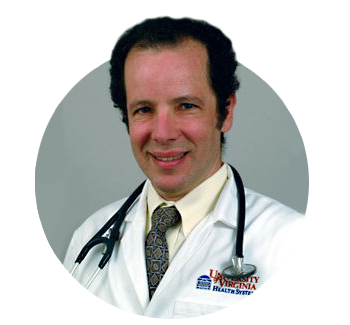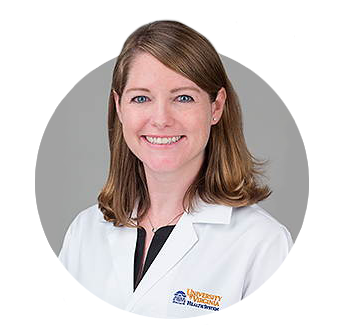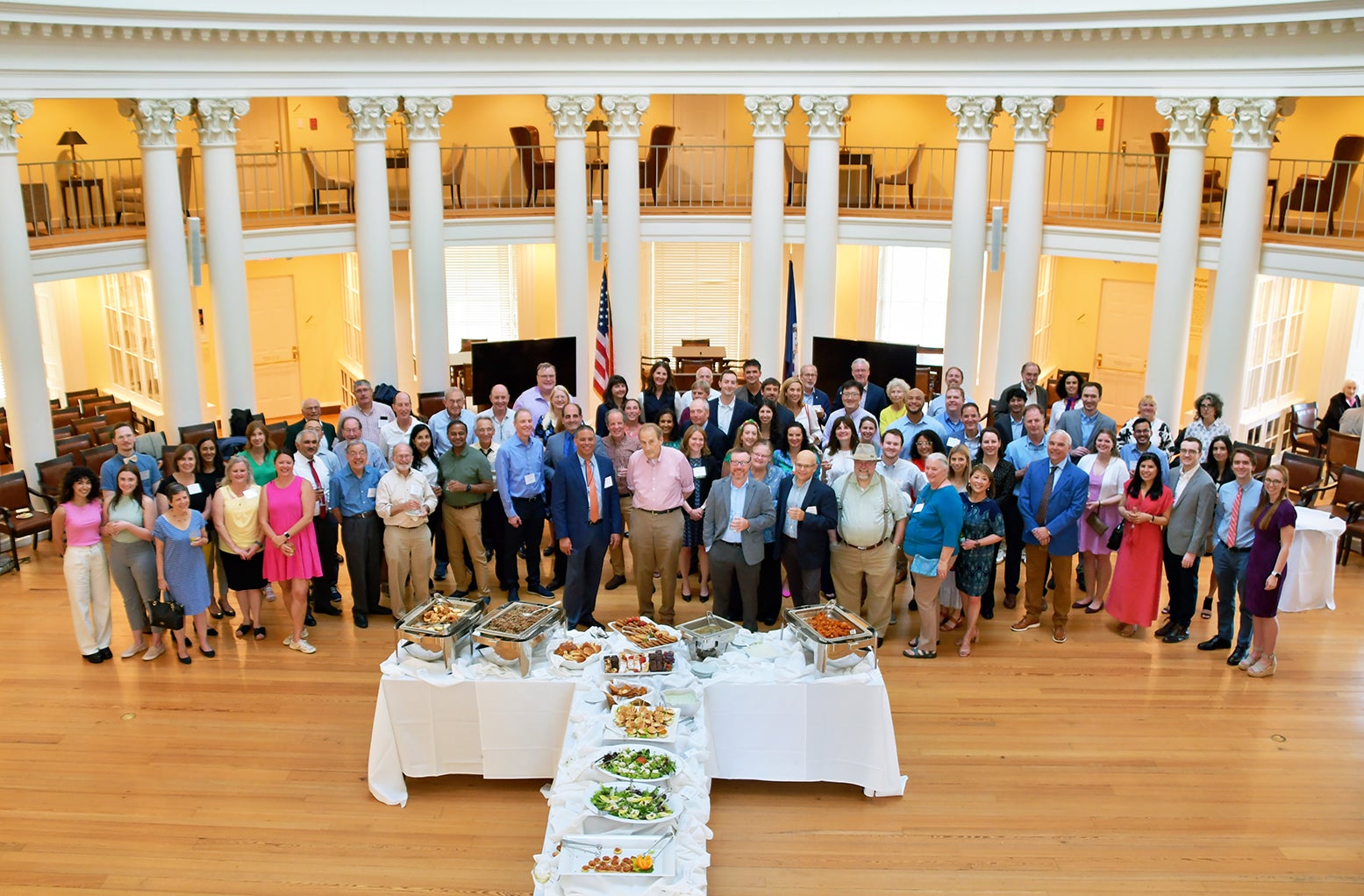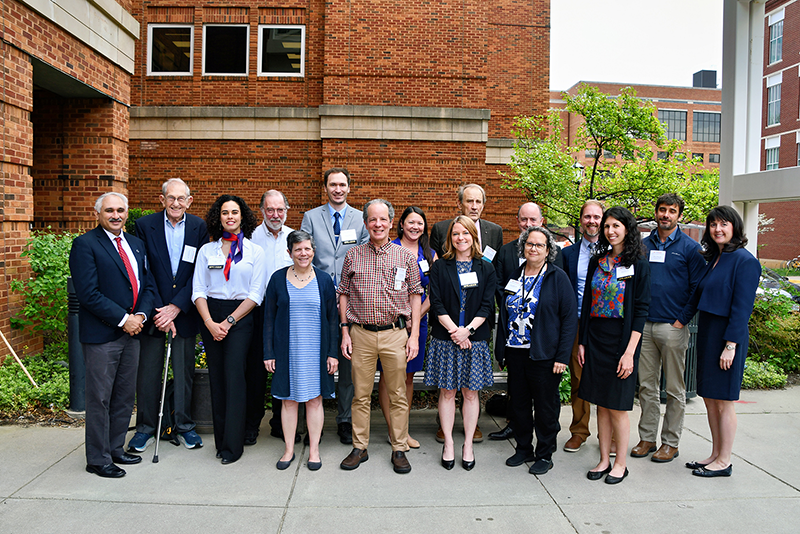Message from Michael Nelson, MD PhD, Asthma, Allergy & Immunology, Division Chief

Michael Nelson, MD, PhD
This year, I want to highlight just how much the University of Virginia Asthma, Allergy, and Immunology Division is defined by its people. We are finding new and exciting ways to contribute to UVA Health’s new mission of transforming health and inspiring hope for all Virginians and beyond.
Highlights of this past year abound, beginning with Swineford 2023. It’s hard to top last year’s 60th anniversary, but by all accounts, we did. This event is one of UVA’s longest-running and most successful CME events that is led by Dr. Platts-Mills. Distinguished invited extramural speakers included Drs. Esther Florsheim (Arizona State University), Jonathan Hourhane (Royal College of Surgeons in Ireland), Amy Klion (NIH), Parameswaran Nair (McMaster University), Whitney Stevens (Northwestern), Cosby Stone (Vanderbilt) and Kelli Williams (Medical University of South Carolina). In keeping with Swineford tradition, talks were cutting edge and immediately applicable to the care of patients spanning the future of biologics to neurobiology of food aversion, genetic testing for inborn errors of immunity, and vaccine allergic reactions, among many others, including IL-33 in Asthma presented by Dr. Anne Sperling from the Pulmonary and Critical Care Division. The event pleasantly concluded with a reception in the Rotunda. Join us next year for Swineford 2024 on April 12-13.
We are indeed transforming health through research. The Platts-Mills and Wilson labs continued their impressive work on alpha-gal hypersensitivity, including generating preliminary challenge data with genetically modified pig meat. The Borish, Woodfolk, and Lawrence labs received new funding to further their work on rhinovirus-induced asthma pathogenesis. They resumed their exciting Viral Infection in Asthma (VIA) Study paused by the pandemic. The Woodfolk lab expanded its work and collaborations on the UVA COVID-19 Recovery Cohort and biorepository. The McGowan lab has newly identified a role for IgG4 in eosinophilic esophagitis and expanded research on minimally invasive procedures advancing EoE diagnostics and clinical investigation. Congratulations on the initial NIH “R” award funding for Dr. McGowan (RO1) and Dr. Wilson (R21)!
Our Division team members continue to be recognized for their excellence in all areas. At the 2022 American College of Asthma, Allergy, and Immunology, Dr. Kelly Boyd, 2nd-year allergy-immunology fellow, received the 1st Place Clemons von Pirquet national research award, and Dr. Will Eschenbacher, 2021 fellowship graduate, received 1st Place in the inaugural journal fellow in training award. Dr. Judith Woodfolk and her COVID-19 Biorepository and Recovery Cohort team received the Dean’s School of Medicine Team Science Award. Monte Parsons was awarded the Leonard W. Sandridge Outstanding Contributor Award for his longstanding contributions to GME and healthcare administration extending well beyond our Division’s walls. Dr. Anna Smith, Dr. Jeff Wilson, and Dr. Emily McGowan received the Department of Medicine Excellence Awards this year. Dr. Monica Lawrence was awarded the 2022 DOM Dr. Diane Snustad Award. Drs. Glenda Canderan and Lyndsey Meuhling were recognized with the Shyr-Te Ju Award during the 2022 Carey Marshall Thorner Scholars’ Day for their work on long COVID. Dr. Anna Smith was selected as faculty for the pre-clerkship at the School of Medicine’s Foundations of Clinical Medicine. Dr. Tim Kyin expertly led our community and regional outreach identifying new means of meeting Virginia patient needs closer to where they live. Dr. Kyin and Rebecca Wade lead an awe-inspiring clinic team enabling care for more patients than ever at our Northridge outpatient clinic.
We said farewell and extended many thanks to Dr. Behnam Keshavarz, Bob Young, and Sandra Arcoraci.
We are delighted to welcome Dr. Lindsey Muehling as our new Research Assistant Professor and Mutinta Bulanda as our new Division Administrator. Finally, 2022 presented our first opportunity to come together as an entire Division with family and clinic personnel since the onset of the pandemic.
This next year provides new opportunities to contribute even more to UVA Health and the School of Medicine’s strategic initiatives and the University’s Great and Good strategic plan. In his iconic book Good to Great, Jim Collins reminds us that the key to success is getting the right people on the bus. “The old adage ‘People are your most important asset’ is wrong. People are not your most important asset. The right people are.” I couldn’t be more proud of our team, overflowing with the right people, dedicated and visionary leaders who continue to reach new heights each year.
~ Michael Nelson MD PhD, Division Chief
Research Updates

Thomas AE Platts-Mills, MD
PLATTS-MILLS LAB
The Platts-Mills lab has a long-standing interest in understanding environmental and immunologic contributions to allergic disease. A significant focus of the lab is related to understanding how dust mites and cat allergens are causally related to asthma. More recently, our lab has been a primary driver in understanding a novel form of allergic reactions to red meat (alpha-gal-syndrome or AGS) caused by tick bites. In 2018, we published a paper on the relationship between sIgE to alpha-gal and evidence of coronary artery disease (CAD), which was obtained by Angela Taylor, MD (UVA Heart and Vascular Center) using intravascular ultrasound (IVUS). In 2022, an influential cardiology group in Sydney, Australia, confirmed our results on the positive association between IgGE to alpha-gal and CAD. Most recently, we saw a female in her forties who had been seen initially 8-10 years prior for a severe episode of anaphylaxis and was diagnosed with AGC. Before her recent visit, she had two myocardial infarctions and five stents in her main cardiac arteries. Between her initial visit and these cardiac events, she maintained a strict diet avoiding mammalian meat and organs; however, she continued to consume dairy products derived from Bos domesticus.
Cases like this emphasize two questions: firstly, should all subjects with positive IgE to alpha-gal be advised to avoid all products derived from mammals; secondly, do we need markers other than IgE to alpha-gal that would help to identify patients who are at high risk for CAD, even though dairy products do not induce clinically apparent allergic reactions?
The most promising candidate for another marker is antibodies to alpha-gal of the IgG3 isotype. IgG3 is an inflammatory immunoglobulin and has recently been reported to ‘increase after porcine or bovine aortic valve implantation.’ We are currently arranging to adapt the ImmunoCap 250 machine to assay IgG3-specific antibodies using reagents provided by Dr. Robert Moverare from PHADIA Thermo-Fisher in Sweden. We expect to have the assay running within the next couple of months.
Studies on TH2 antibody responses and Asthma
We have recently carried out detailed studies on specific IgE and IgG4 antibodies to component allergens of cat and dust mites in sera from six-hundred teenagers participating in the VIVA birth cohort in Boston. The primary evidence on these children shows that dust mites and cats are the primary sources of asthma-related indoor allergens. However, analysis of the data on the two major allergens Der p 1 and Fel d 1 has revealed a striking difference in IgG4 compared to the responses to more recently identified allergens, such as Der p 23, Fel d 4, and Fel d 7. As expected, the primary contributor to specific IgG4 for cat allergens was Fel d 1. However, the surprise is that the other cat allergens show no significant effect on sIgG4 related to living in a home with a cat. The most likely, relevant feature of these secondary allergens is that they are present in extracts in significantly lower quantities. The results imply that IgG4 responses require a higher quantitative exposure than IgE responses. In addition, the results suggest that some of the allergens other than Der p 1 and Fel d 1 have greater relevance to asthma because they induce less IgG4 relative to IgE antibodies.

Judith Woodfolk, PhD
WOODFOLK LAB
It’s been an exciting year for the Woodfolk lab. Dr. Judith Woodfolk’s lab continues to study adaptive immunity to respiratory viruses and allergens in man and how this goes awry in patients with chronic respiratory and allergic diseases. The lab uses an interdisciplinary approach to collect and analyze large cellular datasets (or expansive cell data sets) to gain insight into the immune response and its relation to clinical disease. This year also saw the completion of the COVID Biorepository project just as it hit its third anniversary. Thanks to all involved in the success of this collaborative, institution-wide venture.

Larry Borish, MD
BORISH LAB
The Larry Borish, MD laboratory’s primary focus remains the role of rhinovirus (RV) in precipitating asthma exacerbations. These NIH-funded studies are designed to define the role of innate immune responses, including anti-viral and T2-promoting immune responses, by infected airway epithelial cells as they might distinguish the consequences of RV infections in asthmatics, allergic rhinitis, and healthy control subjects. The Borish lab recently received an R56 grant to generate preliminary data supporting the concept that RV infections produce long-term remodeling in the airway, including expanded populations of IL-25-producing chemosensory cells. In addition, for the next two years, the Borish laboratory will be the co-lead sponsor of a Regeneron-funded investigator-initiated study entitled “Viral Infection in Asthma (VIA) Study.” This randomized, placebo-controlled study assesses cellular and molecular markers related to experimental RV infection in asthmatics and the effect of dupilumab in preventing exacerbations in this investigational model. This study will aim to assess the molecular and cellular basis by which dupilumab prevents the development of an RV-induced asthma exacerbation. Unrelated to the RV studies, the Borish lab collaborates closely with Dr. Gerry Teague in pediatrics as co-PI for studies addressing the role of mast cells and mononuclear phagocytic cells in the immune response to viral respiratory infections in children and adolescents with problematic wheeze. We are also enrolling patients in a Regeneron-sponsored study to demonstrate the ability of dupilumab to attenuate staphylococcus aureus infection in chronic sinusitis and ameliorate the dysbiotic state, including restoration of a healthier antimicrobial state.

Monica Lawrence, MD
LAWRENCE LAB
In collaboration with Dr. Larry Borish, Dr. Monica Lawrence works with Dr. Gerry Teague in Pediatrics to continue studies on severe treatment-refractory asthma in children. Dr. Lawrence also continues as head of the Rhinovirus Core Laboratory. She is working with Dr. Borish and Dr. Judith Woodfolk in ongoing investigations of rhinovirus-induced asthma exacerbations. Along with Dr. Borish and Allergy/Immunology fellow Dr. Thomas Makin, she continues researching the role of a low IgE as a sentinel biomarker for evolving humoral immunodeficiency (research sponsored by the Jeffrey Modell Foundation and CSL Behring).

Emily McGowan, MD
MCGOWAN LAB
Dr. Emily McGowan and her group continue to expand their research on eosinophilic esophagitis (EoE), an emerging form of food allergy. EoE is an allergic condition of the esophagus that affects patients of all ages and, when untreated, leads to esophageal fibrosis and difficulty swallowing. Through her NIH/NIAID K23 Award, Dr. McGowan established the University of Virginia EoE Cohort with her collaborators, Drs. Bryan Sauer (Adult Gastroenterology) and Barrett Barnes (Pediatric Gastroenterology). This cohort longitudinally follows over 350 patients with EoE and has been used to examine the immunologic drivers of this disease. In particular, her team found that immunoglobulin G4 (IgG4) may play an important role in the inflammatory response in EoE. They are examining whether this could be used to help identify food triggers in EoE patients. Dr. McGowan’s group is also studying the epidemiology of EoE and found that children who live far away from a pediatric gastroenterologist, and those who live in more impoverished areas are less likely to be diagnosed with EoE. In addition, they found that EoE is often underdiagnosed among patients with other allergic conditions. They plan to investigate this further with a large-scale screening study using a novel minimally-invasive device called the Cytosponge. This work has been funded by the American College of Gastroenterology (PIs McGowan and Sauer) and the NIH/NIAID (K23 and R21). Dr. McGowan also received the 2022 McCausland Fellowship, which supports her ongoing research.
Dr. McGowan was awarded a 5-year, $3.9 million R01 grant from the NIH to study the role of immunoglobulin G4 (IgG4) antibodies to milk proteins in EoE. Foods primarily trigger EoE, but how foods drive the inflammatory response in EoE is still unclear. Dr. McGowan’s group previously found that IgG4 binds to food proteins in the esophageal tissue of patients with active EoE, which suggests immune complex formation. This grant will further this work to examine whether these IgG4-food complexes contribute to the inflammatory response in EoE. Ultimately, this work will provide novel insights into the mechanisms of food-induced inflammation in EoE and could lead to novel diagnostic assays and therapies. Collaborators on the project include Bryan Sauer, MD MHS, Shyam Raghavan, MD, Sarah Ewald, PhD, Larry Borish, MD, Thomas Platts-Mills, MD PhD, and Judith Woodfolk, PhD.

Jeff Wilson, MD
WILSON LAB
Dr. Jeffrey Wilson has a major clinical and research focus on the alpha-Gal syndrome. Working with Dr. Platts-Mills and colleagues, his lab has been involved in studies to better understand alpha-gal epidemiology locally and across the USA. This work involved a UVA employee cohort recruited to study COVID-19 vaccine antibody responses and a DoD-funded project of 3000 military recruits in collaboration with Dr. Cade Nylund at the Uniformed Services University of the Health Sciences. The lab also studies links between tick bites and alpha-gal sensitization and has recently received an NIH R21 to recruit and follow individuals who have had recent tick bites. Based on a prior observation that alpha-gal sensitization was associated with heart disease, the lab has been involved with the NHLBI-sponsored Multi-Ethnic Study of Atherosclerosis. The goal has been to understand better whether IgE sensitization to alpha-gal is a risk factor for early coronary artery disease development. As part of these investigations, Dr. Wilson has ongoing collaborations with Dr. Coleen McNamara (Cardiology/Beirne Carter Immunology Center) and Prof. Loren Erickson (Microbiology/Beirne Carter Immunology Center) is also studying whether IgE sensitization to more common food allergens also has links with cardiovascular disease. Collaborators in studies investigating antibody responses to COVID-19 include Dr. Judith Woodfolk, Dr. Gerry Teague, Prof. Jie Sun, and others in the Divisions of Hematology/Oncology and Pulmonary/Critical Care.
Education Update
FELLOWSHIP/TRAINEE PROGRAM
Our long-standing fellowship program continues to celebrate the many achievements of our fellows-in-training. In July 2022, we welcomed two new fellows into the program: Dr. Charlene Dunaway Altamirano (Cleveland Clinic, Internal Medicine) and Dr. Marc Breidenbaugh (University of Virginia, Pediatrics). We congratulate our 2023 graduating fellows, Dr. Kelly Boyd, who will enter private practice in Charlotte, North Carolina, and Dr. Thomas Makin, who will join a private practice in Suffolk, Virginia. We also completed a very successful virtual recruitment season and are excited to welcome two new incoming fellows in July 2023: Dr. Samantha Nguyen (Wake Forest University, Internal Medicine) and Dr. Thomas Offerle (Emory University, Pediatrics).
Our fellows have continued to participate in research projects on preschool asthma actively (Dr. Boyd; mentors Dr. Borish and Dr. Teague), selective IgE deficiency (Dr. Makin; mentors Dr. Borish, Dr. Lawrence and Dr. Wilson), the prevalence of food allergy in Honduras (Dr. Dunaway Altamirano; mentors Dr. Nelson, Dr. Platts-Mills, and Dr. Wilson), and GI-predominant alpha-gal syndrome (Dr. Breidenbaugh; mentors Dr. McGowan and Dr. Wilson). They have presented their work at the American Academy of Asthma, Allergy and Immunology (AAAAI) and the American College of Asthma, Allergy, and Immunology (ACAAI) national meetings. The Annual Swineford Allergy Conference was held on Grounds in April 2023. Dr. Boyd was recognized for her outstanding abstract with the first-place Clemens von Pirquet award at this year’s ACAAI meeting. We commend our fellows for their academic scholarship and research achievements on top of a growing inpatient consultation service and busy outpatient clinics.
Awards, Recognitions, and Presentations
Drs. Glenda Canderan and Lyndsey Muehling were joint recipients of the Shyr-Te Ju Award for their work on T-cell mechanisms governing long-haul respiratory symptoms in survivors of severe COVID-19, which was presented at the 2022 Carey-Marshall-Thorner Research and Scholars Day. The same work was awarded an oral presentation as a late-breaking abstract at the 2023 AAAAI meeting.
Dr. Muehling was invited to give a symposium presentation at the 2023 AAAAI meeting entitled: “Viral-bacterial-allergen interactions at the respiratory mucosa.”
Naomi Bryant, a 4th-year graduate student, was awarded a PhD Travel Scholarship to attend the 2023 AAAAI meeting. She gave an oral presentation on a novel method to assess T-cell responses to allergen variants.
FACULTY APPOINTMENTS
Dr. Muehling was appointed to the Research Assistant Professor of Medicine position after completing her post-doctoral fellowship in the Woodfolk lab.
GRANTS
As Faculty Director of the UVA Flow Cytometry Core Facility, Dr. Woodfolk partnered with Michael Solga MS (Director of the Core) to purchase a Cytek Aurora Cell Sorter through the NIH Shared Instrumentation Grant Program (S10). Dr. Woodfolk’s expertise in studying pathogenic T cells in allergic disease was also integral to an NIH/NIAID administrative supplement (PI: T. Platts-Mills, R37 AI020565) and a new NIH/NIAID R01 grant (PI: E. McGowan, R01 AI 175232).
Swineford Conference 2023

On April 14th and 15th, the Division of Asthma, Allergy, and Immunology held its 61st Annual Swineford Allergy Conference at Pinn Hall. It’s the longest-running academic Allergy meeting in the United States and longest running CME event in Virginia. The Division continues to host this conference as a scientific gathering dedicated to educating physicians caring for patients with allergic disorders and for the scientists who work with them to develop a novel understanding of and treatments for allergic disease.
Traditionally an in-person meeting, we were very excited to welcome to the University of Virginia and Charlottesville experts in our field who traveled from great distances to share their knowledge and insight. This year’s faculty included two international speakers (Professor Jonathan Hourihane from the Royal College of Surgeons in Ireland and Parameswaran Nair, MD, PhD, who is the Staff Respirologist at McMaster University in Hamilton, Ontario) and five speakers from

From left: Pram Nair, MD, Kenneth Berger, MD, PhD, Esther B. Florsheim, PhD, William Busse, MD, Amy Klion, MD, Thomas Makin, MD, Larry Borish, MD, Kelli Williams, MD, MPH, Emily McGowan, MD, PhD, Tom Platts-Mills, FRS, Jonathan Hourihane, MD, Anne Sperling, PhD, Cosby Stone, MD, MPH, Kelly Boyd, MD, Jeffrey Wilson MD, PhD, Whitney Stevens, MD, PhD
within the US (Esther Borges, PhD from Arizona State University; Amy Klion, MD from the NIH; Whitney Stevens, MD, PhD from Northwestern University; Cosby Stone, MD, MPH, from Vanderbilt; and Kelli Williams, MD, MPH from MUSC). In keeping with the traditions of this meeting, there were excellent discussions of multiple topics, including the future of biologics in asthma, genetic testing for inborn errors of immunity, the study of antibodies to PEG, and the importance of lipids in maintaining the protective role of the skin of infants.
Not to be outdone by our external Conference Faculty, UVA was well represented by our internal colleagues who gave talks: Jeffrey Wilson, MD, PhD, and Emily McGowan, MD, PhD, as well as Anne Sperling, PhD from Pulmonary and Critical Care Medicine. In keeping with a long-standing tradition, we had two presentations by our trainees: second-year fellows Kelly Boyd, MD, and Thomas Makin, MD.
We have already started to plan for next year’s edition, our 62nd Swineford, which will take place on APRIL 12th and 13th of 2024. Be on the lookout for the information in the Fall! (More Photos)
Filed Under: Basic Research, Clinical Research, Education, In the Know, News and Notes, Notable Achievements, Research
